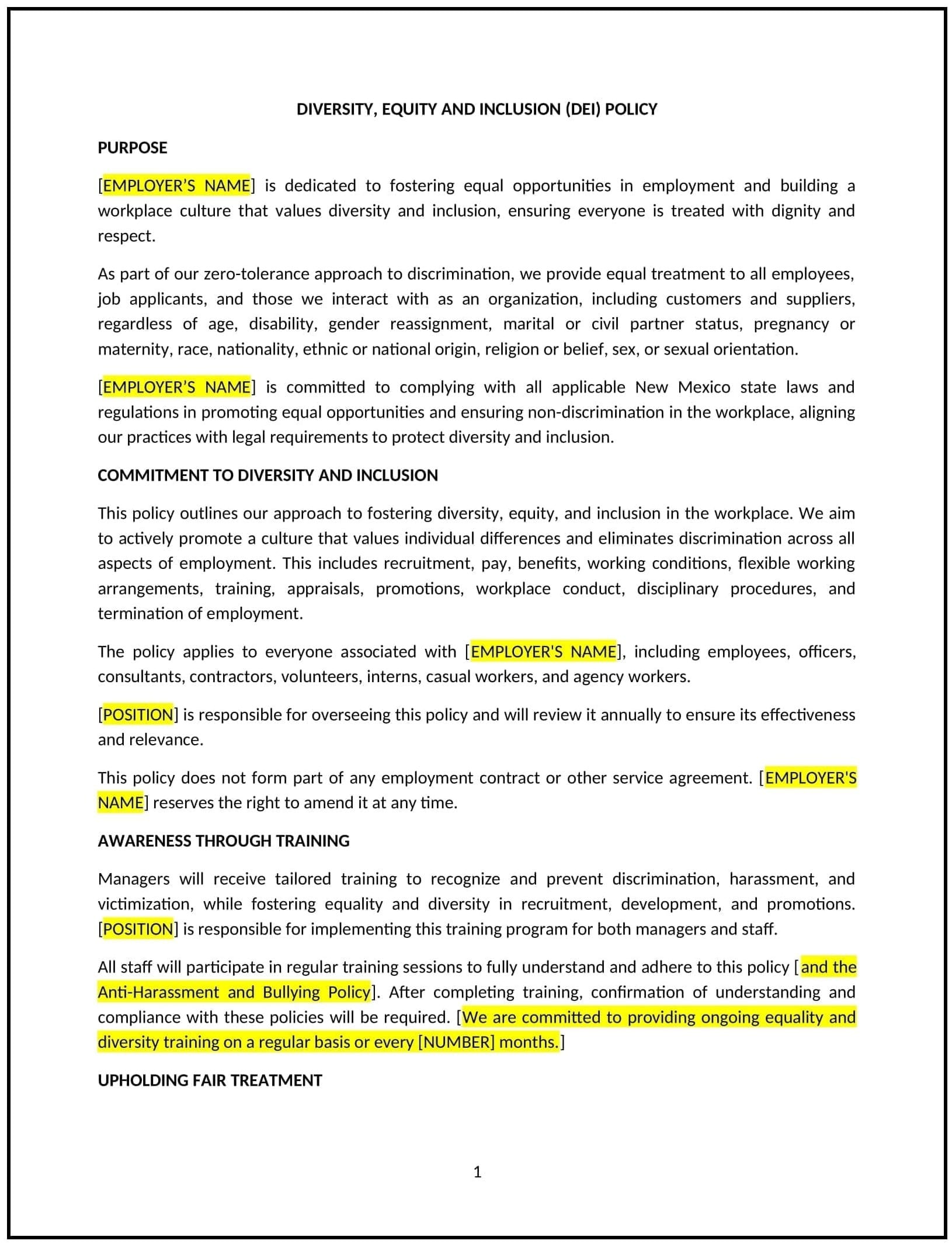Diversity, equity, and inclusion (DEI) policy (New Mexico): Free template
Got contracts to review? While you're here for policies, let Cobrief make contract review effortless—start your free review now.

Customize this template for free
Diversity, equity, and inclusion (DEI) policy (New Mexico)
This diversity, equity, and inclusion (DEI) policy is designed to help New Mexico businesses create a workplace environment that values and respects all individuals, regardless of their background, identity, or experiences. It outlines the business’s commitment to fostering a diverse, equitable, and inclusive workplace by promoting fairness, addressing biases, and ensuring equal opportunities for all employees.
By adopting this policy, New Mexico businesses can attract and retain a diverse workforce, enhance employee satisfaction, and contribute to a positive, inclusive company culture.
How to use this diversity, equity, and inclusion (DEI) policy (New Mexico)
- Define diversity, equity, and inclusion: Clearly define what diversity, equity, and inclusion mean for your business, considering factors such as race, ethnicity, gender, age, sexual orientation, disability, religion, and cultural background.
- Set goals and objectives: Establish measurable DEI goals, such as increasing the representation of underrepresented groups in leadership positions or improving employee satisfaction regarding workplace inclusivity.
- Promote training and education: Provide regular DEI training to all employees, including leadership, to help them understand and address biases, foster inclusivity, and create a welcoming environment.
- Encourage diverse hiring practices: Implement policies and practices that promote diversity in recruitment and hiring, ensuring that job opportunities are accessible to all candidates, regardless of their background.
- Address discrimination and harassment: Clearly state that discrimination, harassment, or any other form of exclusion is not tolerated. Set a process for reporting, investigating, and addressing any complaints of discrimination or harassment.
- Reflect New Mexico-specific considerations: Incorporate any state-specific laws or regulations related to diversity, equity, and inclusion, such as the New Mexico Human Rights Act or policies related to affirmative action in the workplace.
Benefits of using this diversity, equity, and inclusion (DEI) policy (New Mexico)
Implementing this policy provides New Mexico businesses with several advantages:
- Fosters a positive company culture: A DEI policy helps create an environment where all employees feel respected, valued, and included, leading to higher morale and engagement.
- Increases employee retention: Employees are more likely to stay with a company that values diversity and inclusion, reducing turnover and enhancing long-term organizational stability.
- Attracts diverse talent: A commitment to DEI can help businesses attract a broader pool of candidates, improving the quality and creativity of the workforce.
- Enhances innovation and creativity: Diverse teams bring different perspectives and ideas, which can lead to greater innovation, better problem-solving, and more creative solutions.
- Strengthens reputation: A business known for its commitment to DEI is likely to be viewed positively by clients, partners, and customers, enhancing its reputation and appeal.
Tips for using this diversity, equity, and inclusion (DEI) policy (New Mexico)
- Communicate the policy clearly: Ensure that all employees are aware of the DEI policy, including its goals, objectives, and the business’s commitment to fostering an inclusive workplace. Regular communication about DEI initiatives should be shared through internal newsletters, meetings, and employee handbooks.
- Provide DEI training and resources: Offer ongoing DEI training and development opportunities to all employees, including leadership, to ensure everyone understands the importance of diversity and inclusion and how to contribute to a welcoming environment.
- Track progress: Set measurable DEI goals and regularly track progress against those goals. This may include monitoring the diversity of the workforce, collecting feedback from employees, and evaluating the effectiveness of DEI initiatives.
- Address biases in hiring and promotion: Review hiring and promotion practices regularly to ensure they are inclusive and free from bias. This can include using structured interviews, broadening recruitment channels, and ensuring a fair and transparent process for advancement.
- Create an open feedback loop: Encourage employees to provide feedback on DEI initiatives and their experiences in the workplace. This feedback should be used to inform policy adjustments and improvements.
- Review the policy regularly: Periodically review and update the DEI policy to ensure it remains relevant and aligned with New Mexico’s evolving laws, business goals, and industry standards.